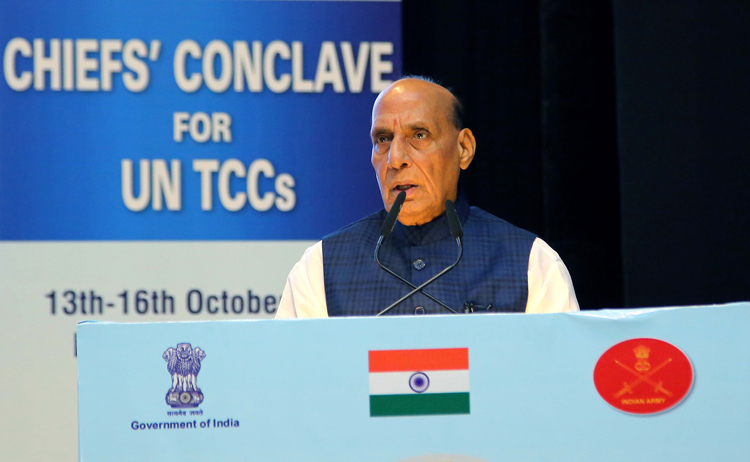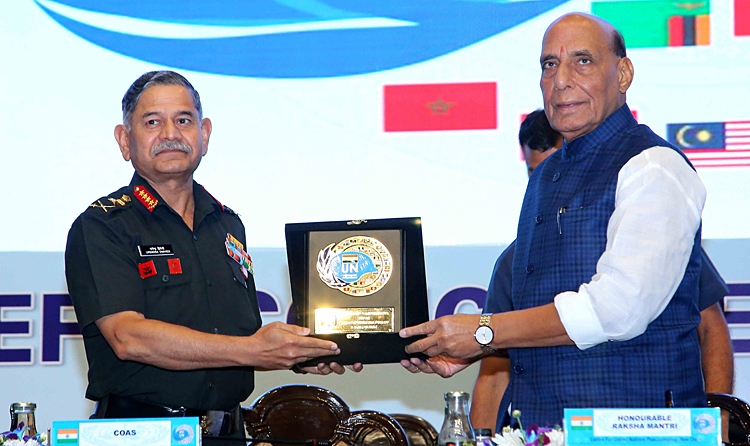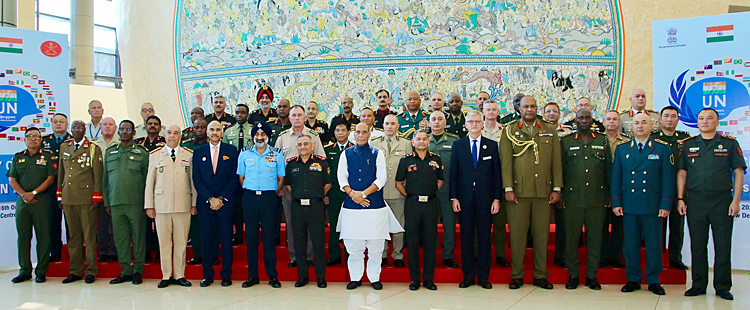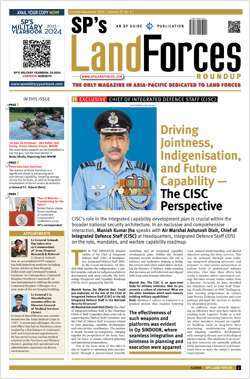INDIAN ARMED FORCES CHIEFS ON OUR RELENTLESS AND FOCUSED PUBLISHING EFFORTS

The insightful articles, inspiring narrations and analytical perspectives presented by the Editorial Team, establish an alluring connect with the reader. My compliments and best wishes to SP Guide Publications.

"Over the past 60 years, the growth of SP Guide Publications has mirrored the rising stature of Indian Navy. Its well-researched and informative magazines on Defence and Aerospace sector have served to shape an educated opinion of our military personnel, policy makers and the public alike. I wish SP's Publication team continued success, fair winds and following seas in all future endeavour!"

Since, its inception in 1964, SP Guide Publications has consistently demonstrated commitment to high-quality journalism in the aerospace and defence sectors, earning a well-deserved reputation as Asia's largest media house in this domain. I wish SP Guide Publications continued success in its pursuit of excellence.
- All about HAMMER Smart Precision Guided Weapon in India — “BEL-Safran Collaboration”
- US to sell $93 million precision artillery, Javelin and Excalibur projectiles to India
- US to sell $93 million precision artillery, Javelin and Excalibur projectiles to India
- India, Germany deepen defence ties as High Defence Committee charts ambitious plan
- True strategic autonomy will come only when our code is as indigenous as our hardware: Rajnath Singh
- India-Israel Joint Working Group Meeting on defence cooperation to boost technology sharing and co-development
- G20 Summit: A Sign of Global Fracture
Enhanced Consultation, Cooperation, Coordination & Capacity Building is key to tackling emerging peacekeeping challenges & ensuring global peace: Defence Minister to Chiefs of UN Troop Contributing Countries
“Nations with advanced technological & financial capabilities need to enhance support for sustainability of peacekeeping ops”

Defence Minister Rajnath Singh has propagated enhanced Consultation, Cooperation, Coordination & Capacity Building - a 4C formula - as a guiding principle for the countries contributing towards United Nations peacekeeping to tackle emerging challenges and ensure global peace. He was addressing the senior military leadership of United Nations Troop Contributing Countries (UNTCC) during the inaugural session of the Chiefs' Conclave, being hosted by India for the first time, at Manekshaw Centre, New Delhi from October 14-16, 2025.
Defence Minister highlighted the growing complexities of the challenges being faced by the peacekeepers today - from deployment in volatile environments where asymmetric warfare, terrorism, and fragile political settlements coexist to operating amid humanitarian crises, pandemics, or natural disasters, and confronting misinformation campaigns. For the sustainability of peacekeeping operations, he urged the member states, especially those with advanced technological and financial capabilities, to enhance their support through troops, police, logistics, technology and specialised capacities. He stressed that innovations such as secure communications, surveillance systems, and unmanned platforms can make missions safer & more effective.
“Reformed multilateralism which reflects realities, gives voice to all stakeholders, addresses contemporary challenges & focuses on human welfare is must for today's interconnected world”
“Meeting the emerging challenges demands, more than bravery, adaptability, innovation on part of the troop contributing countries and a comprehensive mission level approach taking onboard relevant political actors, finance contributing countries, and other key players influencing the conflict environment to achieve the mandate. These operations often fall short due to delayed deployment, inadequate resources, and an insufficient mandate to address the root causes of conflicts. We cannot fight today's challenges with outdated multilateral structures. Without comprehensive reforms, the UN faces a crisis of confidence. For today's interconnected world, we need a reformed multilateralism: That reflects realities; Gives voice to all stakeholders; Addresses contemporary challenges; and focuses on human welfare,” asserted Rajnath Singh.
Defence Minister pointed out that India has always stood firm with the UN in its mission to maintain international peace & security, and it remains steadfast in this commitment. “Over the decades, nearly 2,90,000 Indian personnel have served in more than 50 UN peacekeeping missions, earning global respect for professionalism, courage, and compassion. From the Congo and Korea to South Sudan and Lebanon, our soldiers, police, and medical professionals have stood shoulder to shoulder with the international community to protect the vulnerable and rebuild societies. We are ready to contribute troops, share expertise, and support reforms that make peacekeeping more effective & accountable. Through cooperation and technology sharing, we can build missions that are better equipped, more adaptive & more humane,” he stated.

Adding that the success of peacekeeping depends not only on numbers but on preparedness, Rajnath Singh mentioned about the Centre for United Nations Peacekeeping in New Delhi which has trained participants from over 90 countries. He pointed out that India has the necessary credentials to impart training and developing interoperability between peacekeepers from friendly countries to build the mutual understanding that is essential for mission success.
Defence Minister added that under the Aatmanirbhar Bharat vision, India has developed cost-effective indigenous technologies which strengthen peacekeeping missions in the from of land mobility platforms, secure communications, surveillance systems, unmanned aerial vehicles and medical support solutions.
“Indian women officers serve in missions across Africa & the Middle East are a global symbol of empowerment”
Rajnath Singh described the growing participation of women as one of the most inspiring transformations in peacekeeping, stating that their presence enhances the mission's effectiveness, builds trust with local populations, and brings empathy into operations. “India has been a pioneer in this domain. Our all-women Formed Police Unit deployed to Liberia in 2007 became a global symbol of empowerment. Their professionalism and compassion inspired a generation of Liberian women to join their national police. Today, Indian women officers serve in missions across South Sudan, Golan Heights and Lebanon, leading patrols, engaging with communities, and mentoring local women and youth. They represent the best of what modern peacekeeping can achieve — inclusion, respect, and trust. In 2024, an Indian Army woman peacekeeper was awarded the United Nations Military Gender Advocate of the Year Award for her exemplary service with the UN peacekeeping mission in the Democratic Republic of Congo,” he added.
On the participation of medical peacekeepers, Defence Minister said Indian medical teams have treated thousands of civilians and peacekeepers in UN field hospitals across Africa. “Their service, often under challenging adversities, embodies the finest traditions of the Indian peacekeepers and ethos of the UN in the spirit of humanity,” he said.

Rajnath Singh also underlined the fact that India's aspiration to become a Vishwa Guru is not an assertion of dominance but a call for collaborative and inclusive progress. He voiced India's belief that by sharing its heritage of non-violence and inner peace, UN peacekeeping and peace-building operations can be enriched, fostering a world order where harmony prevails.
“Now-a-days, some nations are openly violating the international rules, some are trying to undermine it, while some want to create their own rules and dominate the next century. In all this, India, while advocating for the reformation of outdated international structures, stands strong in upholding the international rules-based order. India is land of Mahatma Gandhi, where peace is deeply rooted in our philosophy of non-violence and truth. For Mahatma Gandhi, peace was not merely the absence of war, but a positive state of justice, harmony, and moral strength,” added Defence Minister.
“Some nations openly violate international rules, India while advocating for reforms in outdated international structures upholds rules-based order”
In his welcome address, Chief of the Army Staff General Upendra Dwivedi highlighted India's long-standing contributions to UN peacekeeping. He reaffirmed the Indian Army's resolve to provide operational excellence, technological innovation and capacity building through institutions like the Centre for UN Peacekeeping, New Delhi.
The Chief of the Army Staff stressed on the need for innovation, inclusivity and interoperability in peacekeeping. He underlined India's Aatmanirbhar initiatives in defence as scalable solutions for global partners.

Chief of Defence Staff General Anil Chauhan, Chief of the Air Staff Air Chief Marshal Amar Preet Singh, Under-Secretary-General for Peace Operations Jean Pierre Lacroix, Permanent Representative of India to the UN Ambassador Parvathaneni Harish, and senior serving officers and bureaucrats witnessed the inaugural day's events along with other distinguished invitees to collectively chart the future of global peace operations.
The UNTCC Chiefs' Conclave, hosted by Indian Army, brings together senior military leadership from 32 nations that play a pivotal role in UN peacekeeping operations. The conclave is witnessing the participation from Algeria, Armenia, Australia, Bangladesh, Bhutan, Brazil, Burundi, Cambodia, Egypt, Ethiopia, Fiji, France, Ghana, Italy, Kazakhstan, Kenya, Kyrgyzstan, Madagascar, Malaysia, Mongolia, Morocco, Nepal, Nigeria, Poland, Rwanda, Sri Lanka, Senegal, Tanzania, Thailand, Uganda, Uruguay and Vietnam. The conclave also features defence exhibitions for shared capacity building.
The UNTCC serves as a vital forum to address operational challenges, evolving threats, interoperability, inclusivity in decision-making and the role of technology & training in strengthening UN peacekeeping. As one of the largest contributors to UN missions, India is convening this high-level forum to deliberate on operational challenges, evolving threats, share best practices and build shared understanding on future peacekeeping. The Conclave reflects the ethos of Vasudhaiva Kutumbakam (the world is one family).





